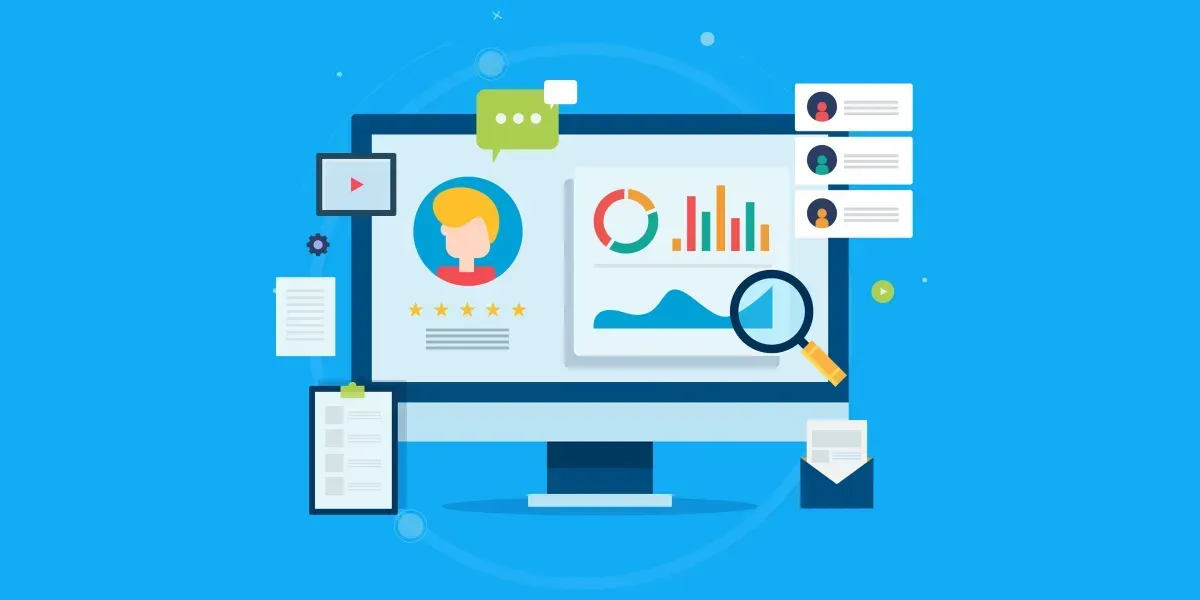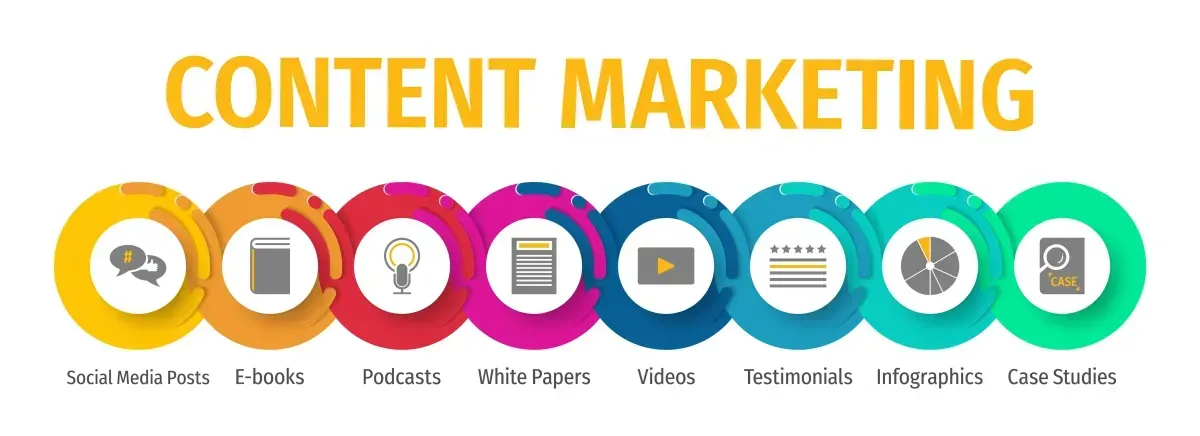The Ultimate Guide
to Effective Internet Marketing
Welcome to our Leadspot CRM page on internet marketing! In today’s digital landscape, maintaining a strong online presence is essential for businesses of all sizes. Leadspot CRM empowers you to connect with your target audience, strengthen brand visibility, and effectively promote your products or services. Whether you're launching your first digital campaign or advancing your marketing strategy, this page provides valuable insights and tips to help you achieve success with internet marketing through Leadspot CRM. Let’s dive in and explore the opportunities that await!
The Ultimate Guide
to Effective Internet Marketing
Welcome to our Leadspot CRM page on internet marketing! In today’s digital landscape, maintaining a strong online presence is essential for businesses of all sizes. Leadspot CRM empowers you to connect with your target audience, strengthen brand visibility, and effectively promote your products or services. Whether you're launching your first digital campaign or advancing your marketing strategy, this page provides valuable insights and tips to help you achieve success with internet marketing through Leadspot CRM. Let’s dive in and explore the opportunities that await!
Internet marketing is a broad digital strategy that includes social media, digital ads, and SEO, offering a powerful way to connect with customers, prospects, and partners online.
The digital age has transformed how we interact and conduct business. Today, the internet allows us to explore our interests from home, access worldwide news in seconds, and share products or services globally, regardless of business size.
Internet marketing encompasses a range of online strategies to promote your business, from digital ads to targeted search engine marketing on platforms like Google and Bing.
Although the internet has been around for decades, online marketing is still evolving. Unlike traditional approaches, it requires knowing where your audience is and what content they engage with—in real-time.
One effective approach is using digital channels, such as social media and email, to build brand awareness and promote products. Alternatively, working with internet marketing experts can boost your online presence by ensuring your business appears prominently in search results without the need for paid ads on every platform.

Internet marketing is a broad digital strategy that includes social media, digital ads, and SEO, offering a powerful way to connect with customers, prospects, and partners online.
The digital age has transformed how we interact and conduct business. Today, the internet allows us to explore our interests from home, access worldwide news in seconds, and share products or services globally, regardless of business size.
Internet marketing encompasses a range of online strategies to promote your business, from digital ads to targeted search engine marketing on platforms like Google and Bing.
Although the internet has been around for decades, online marketing is still evolving. Unlike traditional approaches, it requires knowing where your audience is and what content they engage with—in real-time.
One effective approach is using digital channels, such as social media and email, to build brand awareness and promote products. Alternatively, working with internet marketing experts can boost your online presence by ensuring your business appears prominently in search results without the need for paid ads on every platform.

Digital Marketing vs.
Internet Marketing
Digital marketing is a broad term covering all types of digital media and typically includes most forms of internet marketing, such as social media advertising and search engine optimization (SEO).
Examples of Digital Channels: Common digital marketing channels include websites, mobile apps, email campaigns, PPC (pay-per-click) ads, and digital ads on social media platforms like Facebook and Instagram.
On the other hand, internet marketing specifically involves building an online presence to attract potential customers. This typically begins by creating content that resonates with your audience’s needs, like articles, photos, or social media posts that inform and engage on topics of interest.
For instance, if your business specializes in selling hats for dogs, you might post on Facebook about no-rinse cleansers made for washing pet hair. The aim is to provide engaging content that leads customers to your website or encourages a purchase.
A website serves as an online hub where all digital assets are housed, allowing you to keep engaging with customers across various platforms without requiring them to switch between different digital properties.
Digital Marketing vs.
Internet Marketing
Digital marketing is a broad term covering all types of digital media and typically includes most forms of internet marketing, such as social media advertising and search engine optimization (SEO).
Examples of Digital Channels: Common digital marketing channels include websites, mobile apps, email campaigns, PPC (pay-per-click) ads, and digital ads on social media platforms like Facebook and Instagram.
On the other hand, internet marketing specifically involves building an online presence to attract potential customers. This typically begins by creating content that resonates with your audience’s needs, like articles, photos, or social media posts that inform and engage on topics of interest.
For instance, if your business specializes in selling hats for dogs, you might post on Facebook about no-rinse cleansers made for washing pet hair. The aim is to provide engaging content that leads customers to your website or encourages a purchase.
A website serves as an online hub where all digital assets are housed, allowing you to keep engaging with customers across various platforms without requiring them to switch between different digital properties.
The Fundamentals
of Internet Marketing
1. Search Engine Marketing (SEM)
Search Engine Marketing, or SEM, encompasses various strategies that help content creators boost their website’s visibility in search engine results pages (SERPs). Higher SERP rankings drive more traffic to the site, resulting in improved return on investment (ROI).
SEM is dynamic, adapting as search engines frequently update their algorithms to provide users with the most relevant results. Several key factors influence how well search engines rank your content on SERPs in terms of SEO, including:


Keywords
Keyword research is crucial for SEM success. Content creators strategically use keywords within their posts to ensure search engines easily index them, a process known as on-page optimization. This helps attract more visitors, as search engines prioritize relevant content for users who trust businesses that appear prominently in search results.
Content Quality
Quality content is vital for effective SEM. Rather than focusing on quantity, content creators should aim to deliver well-written, informative content. High-quality articles are valued by users and improve rankings, as they are more likely to engage readers and make information easy to understand and remember.
User Experience
User experience plays a significant role in SEM. When users enjoy the content and layout of a site, it often results in higher SERP rankings. Positive interactions and feedback from users can indicate content relevance and quality, leading to increased traffic and stronger positioning on search engine pages.
Social Media Presence
A strong social media presence is essential for SEO because engagement on platforms like Twitter and Facebook influences search rankings. A well-maintained social presence can reflect brand popularity, attracting audiences and strengthening a site’s position on SERPs by showing user interest and interaction.
Backlinks
Backlinks are another critical factor in SEM. When reputable sites link to your content, it signals trust and authority to search engines. The more high-quality backlinks your site has, the higher it ranks on SERPs, as these links reflect endorsements from other sites, showing value and reliability.
Link Popularity
Search engines assess link popularity as an indicator of a site’s authority. High-ranking sites benefit from backlinks, showing other websites consider their content valuable. This trust boosts traffic and engagement, improving a site’s overall performance on search pages.
User Engagement
User engagement directly impacts SEO, as more interaction with your content boosts your SERP ranking. High engagement signals trust and authority, encouraging search engines to favor your site and enhancing its appeal as a source of valuable information for a broader audience.
Social Engagement
A robust social media strategy is essential, as users often seek brand performance across platforms like Twitter and Facebook. Strong engagement on social media can improve SEO rankings and drive traffic, allowing businesses to leverage social media marketing in their broader strategy to increase visibility and audience reach.
The Fundamentals
of Internet Marketing
1. Search Engine Marketing (SEM)
Search Engine Marketing, or SEM, encompasses various strategies that help content creators boost their website’s visibility in search engine results pages (SERPs). Higher SERP rankings drive more traffic to the site, resulting in improved return on investment (ROI).
SEM is dynamic, adapting as search engines frequently update their algorithms to provide users with the most relevant results. Several key factors influence how well search engines rank your content on SERPs in terms of SEO, including:


Keywords
Keyword research is crucial for SEM success. Content creators strategically use keywords within their posts to ensure search engines easily index them, a process known as on-page optimization. This helps attract more visitors, as search engines prioritize relevant content for users who trust businesses that appear prominently in search results.
Content Quality
Quality content is vital for effective SEM. Rather than focusing on quantity, content creators should aim to deliver well-written, informative content. High-quality articles are valued by users and improve rankings, as they are more likely to engage readers and make information easy to understand and remember.
User Experience
User experience plays a significant role in SEM. When users enjoy the content and layout of a site, it often results in higher SERP rankings. Positive interactions and feedback from users can indicate content relevance and quality, leading to increased traffic and stronger positioning on search engine pages.
Social Media Presence
A strong social media presence is essential for SEO because engagement on platforms like Twitter and Facebook influences search rankings. A well-maintained social presence can reflect brand popularity, attracting audiences and strengthening a site’s position on SERPs by showing user interest and interaction.
Backlinks
Backlinks are another critical factor in SEM. When reputable sites link to your content, it signals trust and authority to search engines. The more high-quality backlinks your site has, the higher it ranks on SERPs, as these links reflect endorsements from other sites, showing value and reliability.
Link Popularity
Search engines assess link popularity as an indicator of a site’s authority. High-ranking sites benefit from backlinks, showing other websites consider their content valuable. This trust boosts traffic and engagement, improving a site’s overall performance on search pages.
User Engagement
User engagement directly impacts SEO, as more interaction with your content boosts your SERP ranking. High engagement signals trust and authority, encouraging search engines to favor your site and enhancing its appeal as a source of valuable information for a broader audience.
Social Engagement
A robust social media strategy is essential, as users often seek brand performance across platforms like Twitter and Facebook. Strong engagement on social media can improve SEO rankings and drive traffic, allowing businesses to leverage social media marketing in their broader strategy to increase visibility and audience reach.

2. Paid Ads (Facebook, Google Ads)
Paid advertising plays a vital role in digital marketing by allowing businesses to set a maximum bid for keywords or phrases, controlling costs while reaching specific audiences with precision. This approach is highly effective for targeting, such as reaching Facebook users who have installed the Messenger app and shown interest in games.
Explore: How to Maximize Your Return on Social Media Ads
3. Email Marketing
Email marketing is a highly efficient and cost-effective way to reach the right audience at the right time with tailored offers and announcements that prompt action. Compared to other media like TV or print, email campaigns are much more affordable, making them a valuable tool in any marketing strategy.


2. Paid Ads (Facebook, Google Ads)
Paid advertising plays a vital role in digital marketing by allowing businesses to set a maximum bid for keywords or phrases, controlling costs while reaching specific audiences with precision. This approach is highly effective for targeting, such as reaching Facebook users who have installed the Messenger app and shown interest in games.
Explore: How to Maximize Your Return on Social Media Ads
3. Email Marketing
Email marketing is a highly efficient and cost-effective way to reach the right audience at the right time with tailored offers and announcements that prompt action. Compared to other media like TV or print, email campaigns are much more affordable, making them a valuable tool in any marketing strategy.


The Advantages of Internet Marketing
with Leadspot CRM
Internet marketing is a cost-effective and adaptable digital approach that fits the needs of any business. Through tools such as digital content, social media, and online advertising, it offers numerous advantages:
Lower Customer Acquisition Costs: Digital channels allow instant access to millions of potential customers globally, making it easier to reach target audiences through online advertising.
Boosted Sales and Brand Awareness: Online presence drives brand visibility and encourages sales growth.
Higher Lead Conversion: Digital platforms capture valuable customer data, including contact details and purchasing behavior, leading to more efficient lead conversions.
Faster Time to Market: Digital channels allow businesses to connect with their audience instantly, accelerating go-to-market times.
Improved Customer Service: With tools like live chat, email, and social media, businesses can deliver prompt and efficient support, enhancing customer satisfaction.

The Advantages of Internet Marketing
with Leadspot CRM
Internet marketing is a cost-effective and adaptable digital approach that fits the needs of any business. Through tools such as digital content, social media, and online advertising, it offers numerous advantages:
Lower Customer Acquisition Costs: Digital channels allow instant access to millions of potential customers globally, making it easier to reach target audiences through online advertising.
Boosted Sales and Brand Awareness: Online presence drives brand visibility and encourages sales growth.
Higher Lead Conversion: Digital platforms capture valuable customer data, including contact details and purchasing behavior, leading to more efficient lead conversions.
Faster Time to Market: Digital channels allow businesses to connect with their audience instantly, accelerating go-to-market times.
Improved Customer Service: With tools like live chat, email, and social media, businesses can deliver prompt and efficient support, enhancing customer satisfaction.

Exploring Content Marketing
Content marketing represents the future of brand outreach. In today’s digital landscape, it’s essential for businesses, organizations, and individuals to establish a strong online presence by producing relevant content. This content—whether informative or creative—serves the needs of both current customers and potential prospects.
As a key part of digital marketing, content marketing is also known as inbound marketing. By addressing the interests and needs of target audiences, it naturally draws prospects to your website. It’s a relationship-building approach that offers value upfront, nurturing customer trust before asking for any return.
The strategy behind content marketing is rooted in trust. Consumers tend to connect with brands that engage them through informative or inspiring content. In fact, 88 percent of marketers report achieving goals related to brand awareness and credibility through content marketing.
Effective content marketing can take many forms:
Blog posts on topics relevant to your brand’s industry
How-to videos, product demos, and vlogs
Infographics that present information in an engaging, visual format
Downloadable resources like PDFs or e-books
Social media posts
Product comparison guides
Contests and giveaways to boost engagement

Millions of potential customers may currently be unaware of your brand. However, through content marketing, you can build trust and increase brand awareness with your target audience.
For instance, if you want your brand to convey a lighthearted vibe, consider creating humorous posts or tapping into popular meme culture. You can also capture attention visually with engaging lists, customer testimonials, and a variety of other creative formats.

Exploring Content Marketing
The essential focus here is "relevant content." It’s important to publish material that aligns with your company and product or service while engaging your audience effectively. This means your content should resonate with them in terms of both topics and style, whether that’s through humorous videos or informative blog posts.
There are various content types that can capture your target audience's attention, but the key is to identify what resonates most with your customers. Some may respond better to social media campaigns and surveys, while others might prefer in-depth how-to videos.
Content marketing today emphasizes creating not just high-quality content but also engaging and personalized content for your audience. By employing a data-driven approach, content marketers can develop highly targeted material that strikes a chord with readers.
So, what does the future of content marketing look like?
Personalized Content
As technology continues to evolve, marketers will have the ability to personalize content even further. This means your audience will receive information tailored specifically to their interests and needs, significantly boosting the likelihood of engagement.Interactive Content
In addition to becoming more personalized, content will also be more interactive, allowing your audience to engage in various ways, such as commenting, sharing, and liking.Video Engagement
Video content is already the most popular format, and its prominence will only grow. People are naturally drawn to video because it’s engaging and easily consumable, prompting more brands to incorporate it into their strategies for reaching target audiences.

Exploring Content Marketing
Content marketing represents the future of brand outreach. In today’s digital landscape, it’s essential for businesses, organizations, and individuals to establish a strong online presence by producing relevant content. This content—whether informative or creative—serves the needs of both current customers and potential prospects.
As a key part of digital marketing, content marketing is also known as inbound marketing. By addressing the interests and needs of target audiences, it naturally draws prospects to your website. It’s a relationship-building approach that offers value upfront, nurturing customer trust before asking for any return.
The strategy behind content marketing is rooted in trust. Consumers tend to connect with brands that engage them through informative or inspiring content. In fact, 88 percent of marketers report achieving goals related to brand awareness and credibility through content marketing.
Effective content marketing can take many forms:
Blog posts on topics relevant to your brand’s industry
How-to videos, product demos, and vlogs
Infographics that present information in an engaging, visual format
Downloadable resources like PDFs or e-books
Social media posts
Product comparison guides
Contests and giveaways to boost engagement

Millions of potential customers may currently be unaware of your brand. However, through content marketing, you can build trust and increase brand awareness with your target audience.
For instance, if you want your brand to convey a lighthearted vibe, consider creating humorous posts or tapping into popular meme culture. You can also capture attention visually with engaging lists, customer testimonials, and a variety of other creative formats.

Exploring Content Marketing
The essential focus here is "relevant content." It’s important to publish material that aligns with your company and product or service while engaging your audience effectively. This means your content should resonate with them in terms of both topics and style, whether that’s through humorous videos or informative blog posts.
There are various content types that can capture your target audience's attention, but the key is to identify what resonates most with your customers. Some may respond better to social media campaigns and surveys, while others might prefer in-depth how-to videos.
Content marketing today emphasizes creating not just high-quality content but also engaging and personalized content for your audience. By employing a data-driven approach, content marketers can develop highly targeted material that strikes a chord with readers.
So, what does the future of content marketing look like?
Personalized Content
As technology continues to evolve, marketers will have the ability to personalize content even further. This means your audience will receive information tailored specifically to their interests and needs, significantly boosting the likelihood of engagement.Interactive Content
In addition to becoming more personalized, content will also be more interactive, allowing your audience to engage in various ways, such as commenting, sharing, and liking.Video Engagement
Video content is already the most popular format, and its prominence will only grow. People are naturally drawn to video because it’s engaging and easily consumable, prompting more brands to incorporate it into their strategies for reaching target audiences.

How to Develop a Content
Marketing Strategy
Define Your Marketing Objectives
Start by assessing your company’s content needs. Ask yourself questions like: What are your objectives? Why do you think they matter? It’s essential to have a clear vision and defined goals.Identify the Content to Create
Begin brainstorming potential topics for future content, such as customer testimonials, behind-the-scenes glimpses of products or services, or blog posts discussing current trends.Establish a Content Production Schedule
Create a content calendar to help you stay organized and prioritize the most critical material for your business.Plan Your Content Promotion Strategy
Assess how much effort you can invest in content creation based on your available resources, including time and budget.Implement Analytics to Measure Success
As you develop your content strategy, ensure you regularly track and report on your progress to see if you're meeting your objectives. Allocate time for keyword research to enhance your content's visibility.

How to Develop a Content Marketing Strategy
Define Your Marketing Objectives
Start by assessing your company’s content needs. Ask yourself questions like: What are your objectives? Why do you think they matter? It’s essential to have a clear vision and defined goals.Identify the Content to Create
Begin brainstorming potential topics for future content, such as customer testimonials, behind-the-scenes glimpses of products or services, or blog posts discussing current trends.Establish a Content Production Schedule
Create a content calendar to help you stay organized and prioritize the most critical material for your business.Plan Your Content Promotion Strategy
Assess how much effort you can invest in content creation based on your available resources, including time and budget.Implement Analytics to Measure Success
As you develop your content strategy, ensure you regularly track and report on your progress to see if you're meeting your objectives. Allocate time for keyword research to enhance your content's visibility.

Exploring Content Marketing
Content marketing represents the future of brand outreach. In today’s digital landscape, it’s essential for businesses, organizations, and individuals to establish a strong online presence by producing relevant content. This content—whether informative or creative—serves the needs of both current customers and potential prospects.
As a key part of digital marketing, content marketing is also known as inbound marketing. By addressing the interests and needs of target audiences, it naturally draws prospects to your website. It’s a relationship-building approach that offers value upfront, nurturing customer trust before asking for any return.
The strategy behind content marketing is rooted in trust. Consumers tend to connect with brands that engage them through informative or inspiring content. In fact, 88 percent of marketers report achieving goals related to brand awareness and credibility through content marketing.
Effective content marketing can take many forms:
Blog posts on topics relevant to your brand’s industry
How-to videos, product demos, and vlogs
Infographics that present information in an engaging, visual format
Downloadable resources like PDFs or e-books
Social media posts
Product comparison guides
Contests and giveaways to boost engagement

Millions of potential customers may currently be unaware of your brand. However, through content marketing, you can build trust and increase brand awareness with your target audience.
For instance, if you want your brand to convey a lighthearted vibe, consider creating humorous posts or tapping into popular meme culture. You can also capture attention visually with engaging lists, customer testimonials, and a variety of other creative formats.

Exploring Content Marketing
The essential focus here is "relevant content." It’s important to publish material that aligns with your company and product or service while engaging your audience effectively. This means your content should resonate with them in terms of both topics and style, whether that’s through humorous videos or informative blog posts.
There are various content types that can capture your target audience's attention, but the key is to identify what resonates most with your customers. Some may respond better to social media campaigns and surveys, while others might prefer in-depth how-to videos.
Content marketing today emphasizes creating not just high-quality content but also engaging and personalized content for your audience. By employing a data-driven approach, content marketers can develop highly targeted material that strikes a chord with readers.
So, what does the future of content marketing look like?
Personalized Content
As technology continues to evolve, marketers will have the ability to personalize content even further. This means your audience will receive information tailored specifically to their interests and needs, significantly boosting the likelihood of engagement.Interactive Content
In addition to becoming more personalized, content will also be more interactive, allowing your audience to engage in various ways, such as commenting, sharing, and liking.Video Engagement
Video content is already the most popular format, and its prominence will only grow. People are naturally drawn to video because it’s engaging and easily consumable, prompting more brands to incorporate it into their strategies for reaching target audiences.

617 SW 8th Ave., Amarillo TX 79101
(806) 835-5554
About
Blog
COMPANY
Contact Us
Copyright © GrowthStack CRM 2024
